University of Florida: Research Proposal on Waste Segregation Drivers
VerifiedAdded on 2020/02/14
|7
|1428
|51
Report
AI Summary
This research proposal investigates the factors that motivate and drive students at the University of Florida to correctly segregate and dispose of waste. The study employs a qualitative research design, specifically structured interviews, to explore student motivators, correct waste streams, and potential methods for encouraging proper waste disposal. The proposal outlines sampling considerations, including the use of simple random sampling, and acknowledges potential limitations such as time constraints and associated costs. It also details procedural considerations for conducting effective interviews, including ethical guidelines and potential issues like participant responses and equipment malfunctions. The aim is to identify the factors that influence students' waste disposal habits and contribute to improved waste management practices within the university community. The proposal includes a detailed table of contents and a list of relevant references.
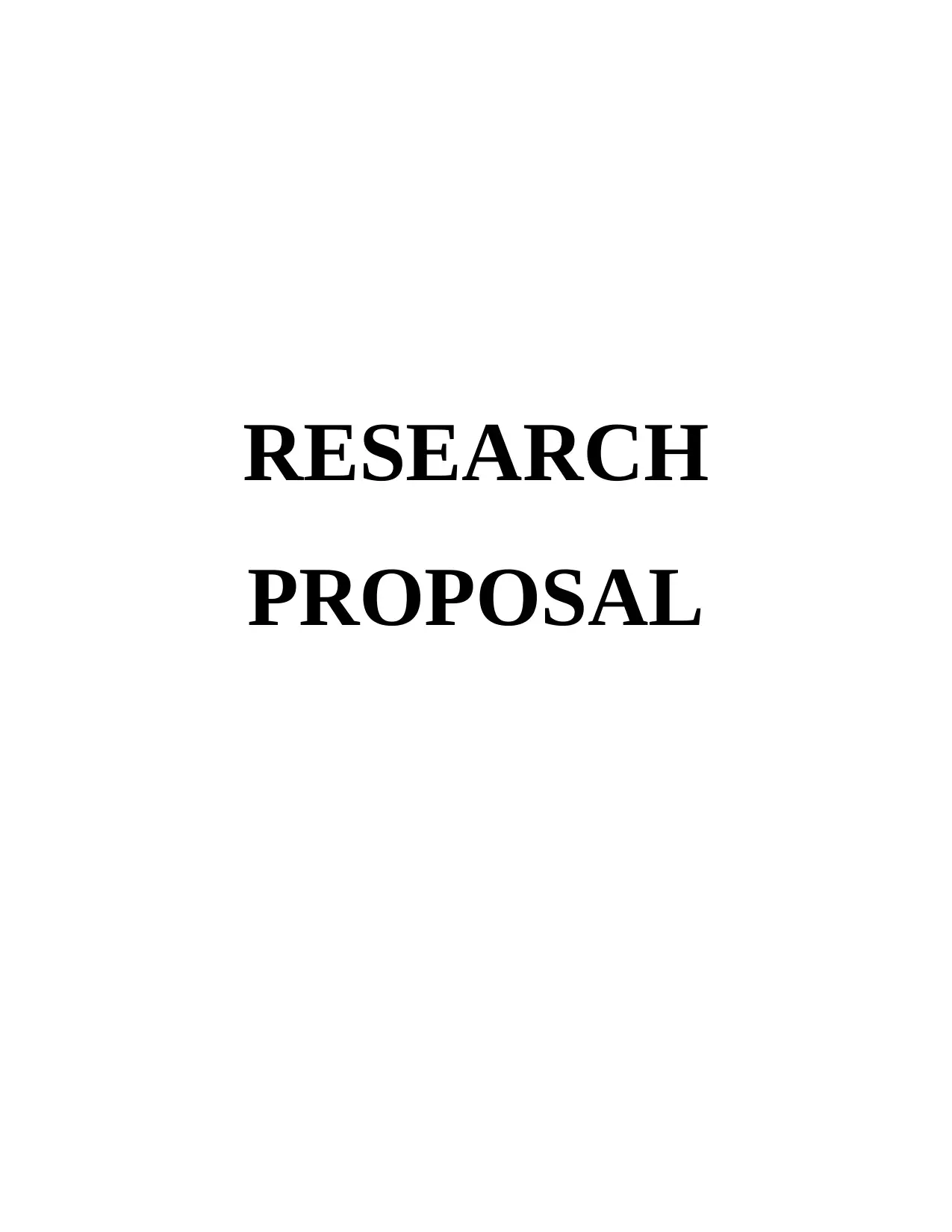
RESEARCH
PROPOSAL
PROPOSAL
Paraphrase This Document
Need a fresh take? Get an instant paraphrase of this document with our AI Paraphraser
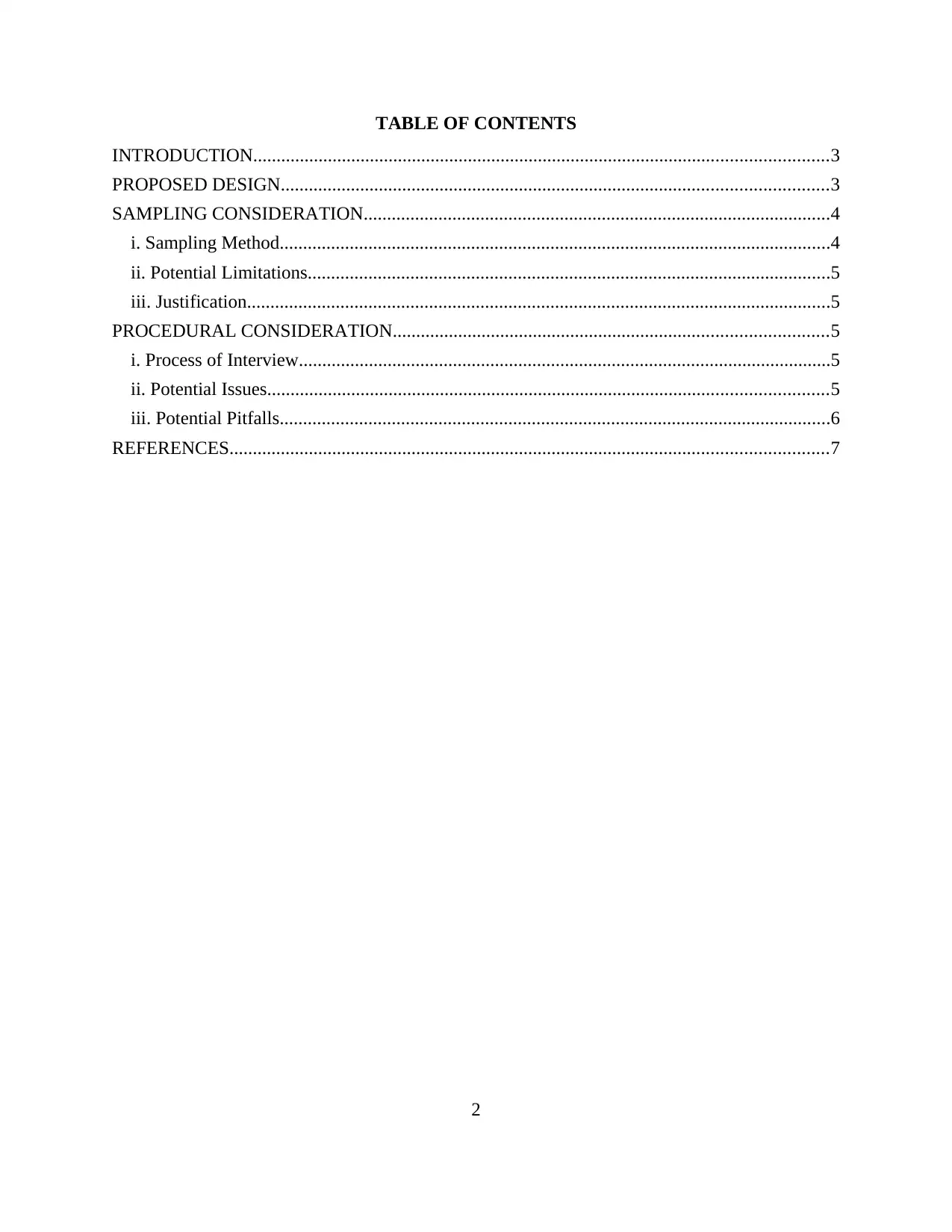
TABLE OF CONTENTS
INTRODUCTION...........................................................................................................................3
PROPOSED DESIGN.....................................................................................................................3
SAMPLING CONSIDERATION....................................................................................................4
i. Sampling Method......................................................................................................................4
ii. Potential Limitations................................................................................................................5
iii. Justification.............................................................................................................................5
PROCEDURAL CONSIDERATION.............................................................................................5
i. Process of Interview..................................................................................................................5
ii. Potential Issues........................................................................................................................5
iii. Potential Pitfalls......................................................................................................................6
REFERENCES................................................................................................................................7
2
INTRODUCTION...........................................................................................................................3
PROPOSED DESIGN.....................................................................................................................3
SAMPLING CONSIDERATION....................................................................................................4
i. Sampling Method......................................................................................................................4
ii. Potential Limitations................................................................................................................5
iii. Justification.............................................................................................................................5
PROCEDURAL CONSIDERATION.............................................................................................5
i. Process of Interview..................................................................................................................5
ii. Potential Issues........................................................................................................................5
iii. Potential Pitfalls......................................................................................................................6
REFERENCES................................................................................................................................7
2
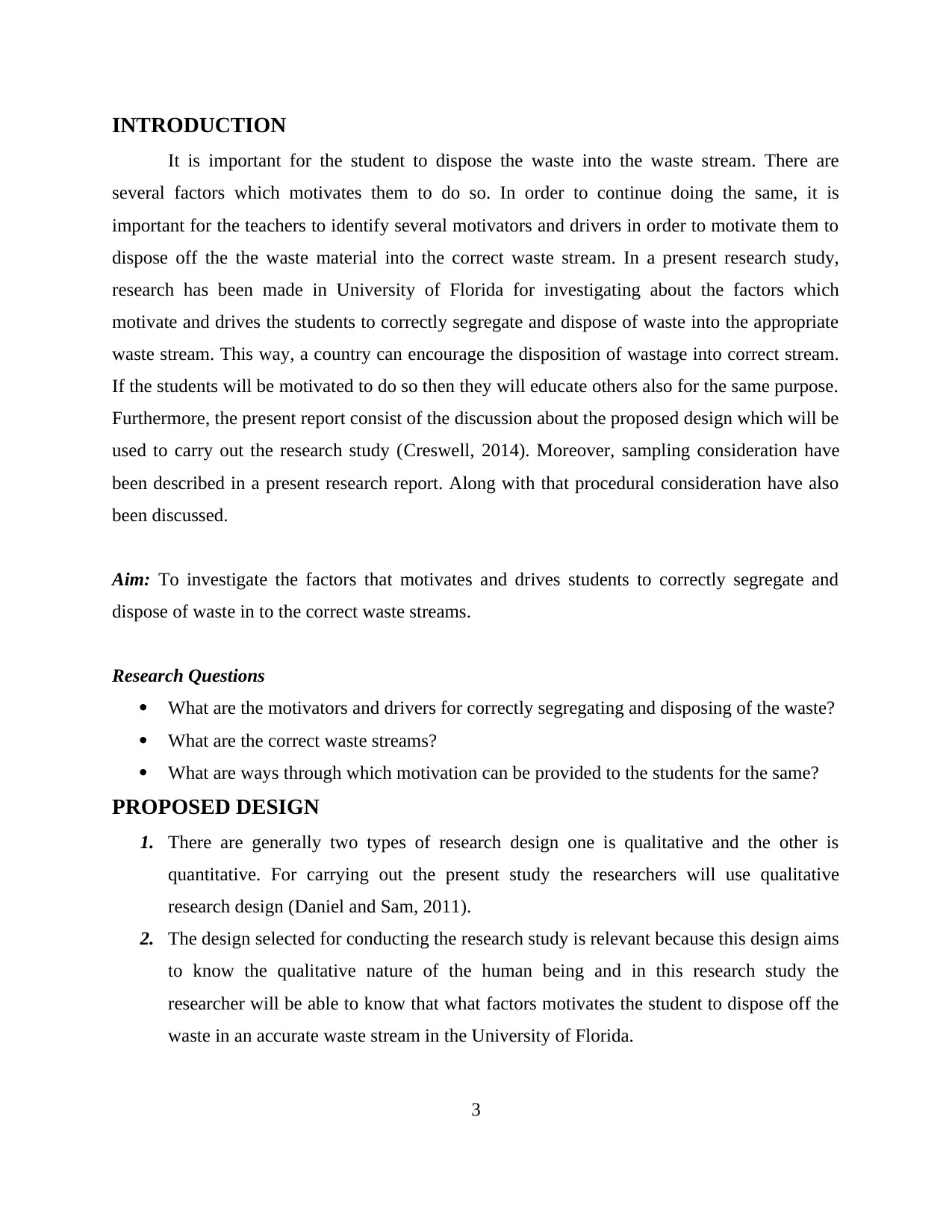
INTRODUCTION
It is important for the student to dispose the waste into the waste stream. There are
several factors which motivates them to do so. In order to continue doing the same, it is
important for the teachers to identify several motivators and drivers in order to motivate them to
dispose off the the waste material into the correct waste stream. In a present research study,
research has been made in University of Florida for investigating about the factors which
motivate and drives the students to correctly segregate and dispose of waste into the appropriate
waste stream. This way, a country can encourage the disposition of wastage into correct stream.
If the students will be motivated to do so then they will educate others also for the same purpose.
Furthermore, the present report consist of the discussion about the proposed design which will be
used to carry out the research study (Creswell, 2014). Moreover, sampling consideration have
been described in a present research report. Along with that procedural consideration have also
been discussed.
Aim: To investigate the factors that motivates and drives students to correctly segregate and
dispose of waste in to the correct waste streams.
Research Questions
What are the motivators and drivers for correctly segregating and disposing of the waste?
What are the correct waste streams?
What are ways through which motivation can be provided to the students for the same?
PROPOSED DESIGN
1. There are generally two types of research design one is qualitative and the other is
quantitative. For carrying out the present study the researchers will use qualitative
research design (Daniel and Sam, 2011).
2. The design selected for conducting the research study is relevant because this design aims
to know the qualitative nature of the human being and in this research study the
researcher will be able to know that what factors motivates the student to dispose off the
waste in an accurate waste stream in the University of Florida.
3
It is important for the student to dispose the waste into the waste stream. There are
several factors which motivates them to do so. In order to continue doing the same, it is
important for the teachers to identify several motivators and drivers in order to motivate them to
dispose off the the waste material into the correct waste stream. In a present research study,
research has been made in University of Florida for investigating about the factors which
motivate and drives the students to correctly segregate and dispose of waste into the appropriate
waste stream. This way, a country can encourage the disposition of wastage into correct stream.
If the students will be motivated to do so then they will educate others also for the same purpose.
Furthermore, the present report consist of the discussion about the proposed design which will be
used to carry out the research study (Creswell, 2014). Moreover, sampling consideration have
been described in a present research report. Along with that procedural consideration have also
been discussed.
Aim: To investigate the factors that motivates and drives students to correctly segregate and
dispose of waste in to the correct waste streams.
Research Questions
What are the motivators and drivers for correctly segregating and disposing of the waste?
What are the correct waste streams?
What are ways through which motivation can be provided to the students for the same?
PROPOSED DESIGN
1. There are generally two types of research design one is qualitative and the other is
quantitative. For carrying out the present study the researchers will use qualitative
research design (Daniel and Sam, 2011).
2. The design selected for conducting the research study is relevant because this design aims
to know the qualitative nature of the human being and in this research study the
researcher will be able to know that what factors motivates the student to dispose off the
waste in an accurate waste stream in the University of Florida.
3
⊘ This is a preview!⊘
Do you want full access?
Subscribe today to unlock all pages.

Trusted by 1+ million students worldwide
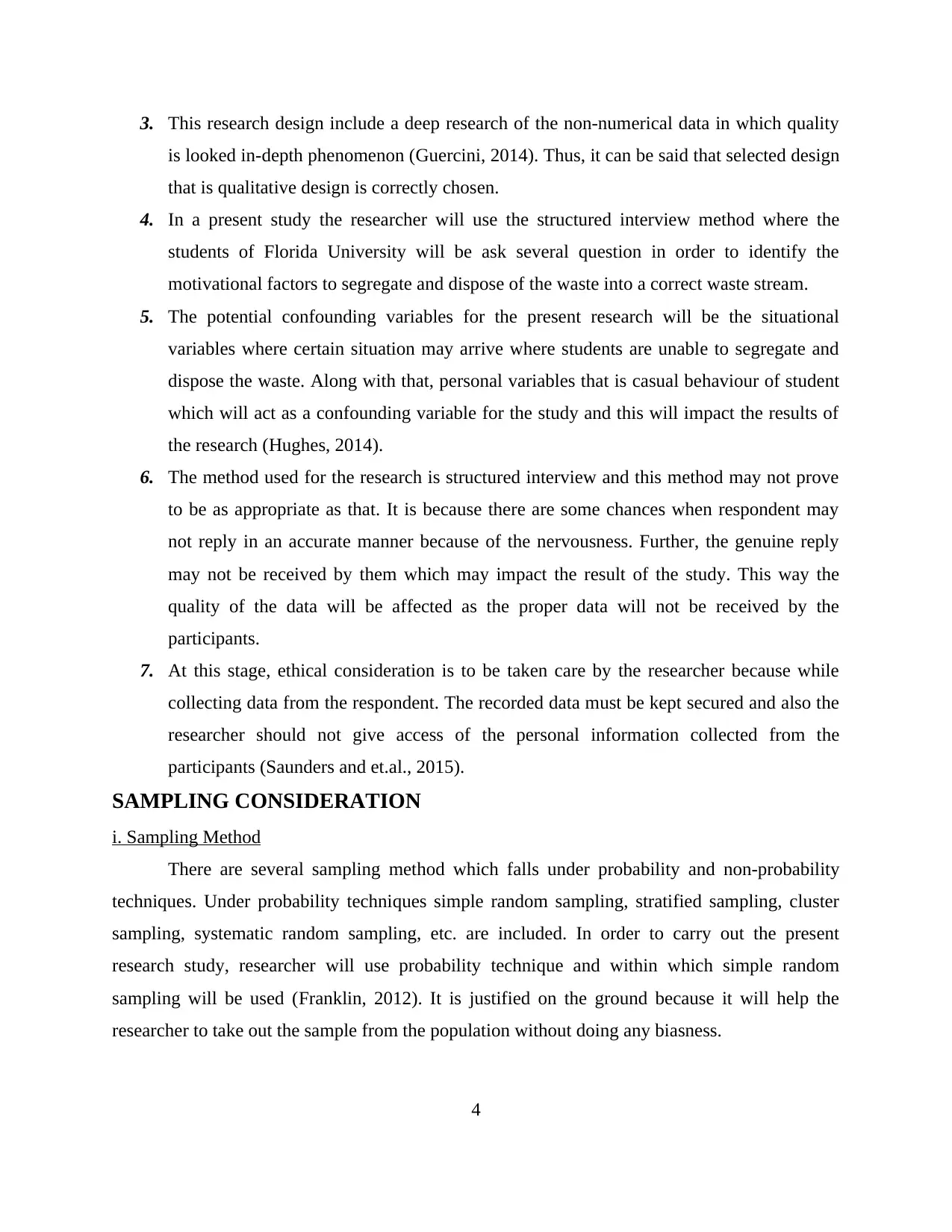
3. This research design include a deep research of the non-numerical data in which quality
is looked in-depth phenomenon (Guercini, 2014). Thus, it can be said that selected design
that is qualitative design is correctly chosen.
4. In a present study the researcher will use the structured interview method where the
students of Florida University will be ask several question in order to identify the
motivational factors to segregate and dispose of the waste into a correct waste stream.
5. The potential confounding variables for the present research will be the situational
variables where certain situation may arrive where students are unable to segregate and
dispose the waste. Along with that, personal variables that is casual behaviour of student
which will act as a confounding variable for the study and this will impact the results of
the research (Hughes, 2014).
6. The method used for the research is structured interview and this method may not prove
to be as appropriate as that. It is because there are some chances when respondent may
not reply in an accurate manner because of the nervousness. Further, the genuine reply
may not be received by them which may impact the result of the study. This way the
quality of the data will be affected as the proper data will not be received by the
participants.
7. At this stage, ethical consideration is to be taken care by the researcher because while
collecting data from the respondent. The recorded data must be kept secured and also the
researcher should not give access of the personal information collected from the
participants (Saunders and et.al., 2015).
SAMPLING CONSIDERATION
i. Sampling Method
There are several sampling method which falls under probability and non-probability
techniques. Under probability techniques simple random sampling, stratified sampling, cluster
sampling, systematic random sampling, etc. are included. In order to carry out the present
research study, researcher will use probability technique and within which simple random
sampling will be used (Franklin, 2012). It is justified on the ground because it will help the
researcher to take out the sample from the population without doing any biasness.
4
is looked in-depth phenomenon (Guercini, 2014). Thus, it can be said that selected design
that is qualitative design is correctly chosen.
4. In a present study the researcher will use the structured interview method where the
students of Florida University will be ask several question in order to identify the
motivational factors to segregate and dispose of the waste into a correct waste stream.
5. The potential confounding variables for the present research will be the situational
variables where certain situation may arrive where students are unable to segregate and
dispose the waste. Along with that, personal variables that is casual behaviour of student
which will act as a confounding variable for the study and this will impact the results of
the research (Hughes, 2014).
6. The method used for the research is structured interview and this method may not prove
to be as appropriate as that. It is because there are some chances when respondent may
not reply in an accurate manner because of the nervousness. Further, the genuine reply
may not be received by them which may impact the result of the study. This way the
quality of the data will be affected as the proper data will not be received by the
participants.
7. At this stage, ethical consideration is to be taken care by the researcher because while
collecting data from the respondent. The recorded data must be kept secured and also the
researcher should not give access of the personal information collected from the
participants (Saunders and et.al., 2015).
SAMPLING CONSIDERATION
i. Sampling Method
There are several sampling method which falls under probability and non-probability
techniques. Under probability techniques simple random sampling, stratified sampling, cluster
sampling, systematic random sampling, etc. are included. In order to carry out the present
research study, researcher will use probability technique and within which simple random
sampling will be used (Franklin, 2012). It is justified on the ground because it will help the
researcher to take out the sample from the population without doing any biasness.
4
Paraphrase This Document
Need a fresh take? Get an instant paraphrase of this document with our AI Paraphraser
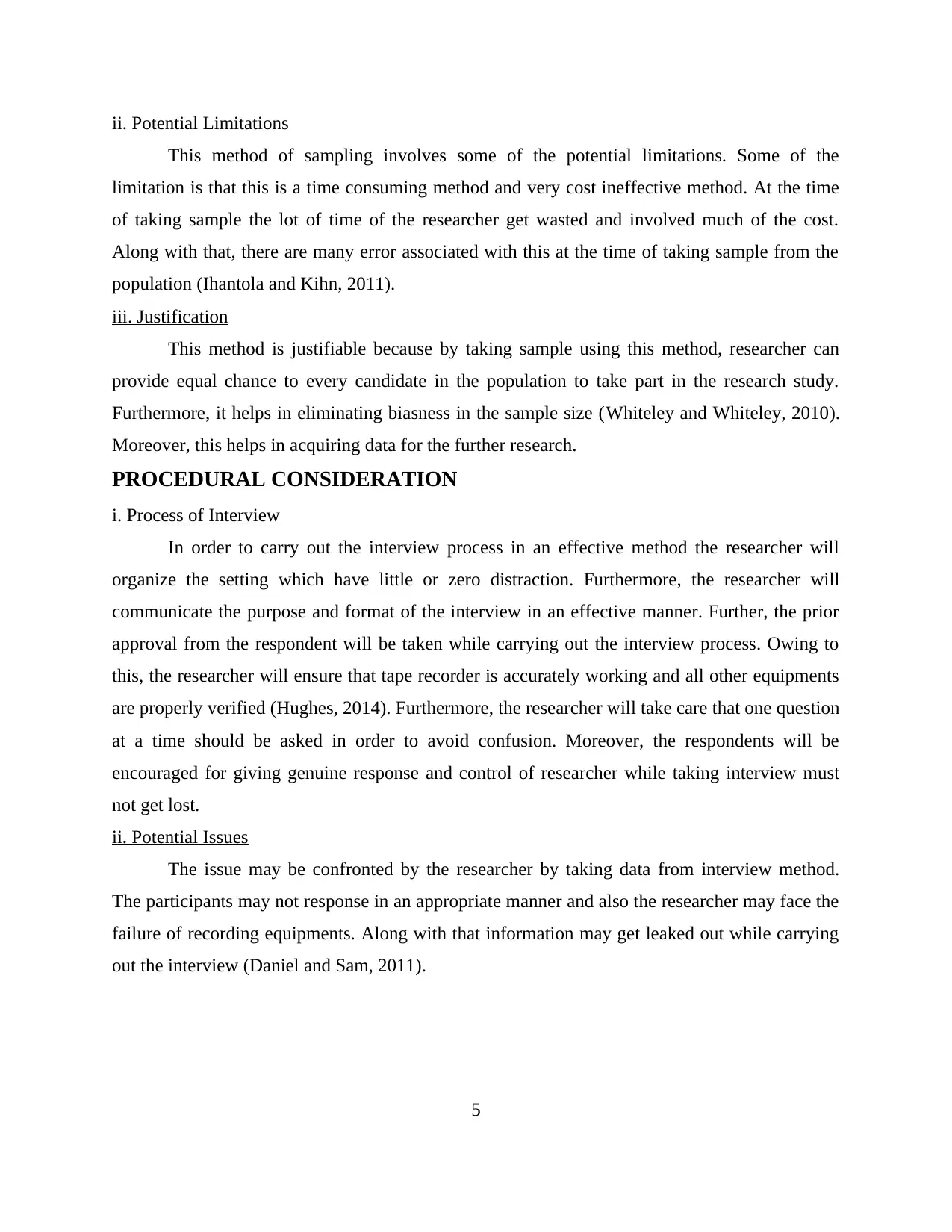
ii. Potential Limitations
This method of sampling involves some of the potential limitations. Some of the
limitation is that this is a time consuming method and very cost ineffective method. At the time
of taking sample the lot of time of the researcher get wasted and involved much of the cost.
Along with that, there are many error associated with this at the time of taking sample from the
population (Ihantola and Kihn, 2011).
iii. Justification
This method is justifiable because by taking sample using this method, researcher can
provide equal chance to every candidate in the population to take part in the research study.
Furthermore, it helps in eliminating biasness in the sample size (Whiteley and Whiteley, 2010).
Moreover, this helps in acquiring data for the further research.
PROCEDURAL CONSIDERATION
i. Process of Interview
In order to carry out the interview process in an effective method the researcher will
organize the setting which have little or zero distraction. Furthermore, the researcher will
communicate the purpose and format of the interview in an effective manner. Further, the prior
approval from the respondent will be taken while carrying out the interview process. Owing to
this, the researcher will ensure that tape recorder is accurately working and all other equipments
are properly verified (Hughes, 2014). Furthermore, the researcher will take care that one question
at a time should be asked in order to avoid confusion. Moreover, the respondents will be
encouraged for giving genuine response and control of researcher while taking interview must
not get lost.
ii. Potential Issues
The issue may be confronted by the researcher by taking data from interview method.
The participants may not response in an appropriate manner and also the researcher may face the
failure of recording equipments. Along with that information may get leaked out while carrying
out the interview (Daniel and Sam, 2011).
5
This method of sampling involves some of the potential limitations. Some of the
limitation is that this is a time consuming method and very cost ineffective method. At the time
of taking sample the lot of time of the researcher get wasted and involved much of the cost.
Along with that, there are many error associated with this at the time of taking sample from the
population (Ihantola and Kihn, 2011).
iii. Justification
This method is justifiable because by taking sample using this method, researcher can
provide equal chance to every candidate in the population to take part in the research study.
Furthermore, it helps in eliminating biasness in the sample size (Whiteley and Whiteley, 2010).
Moreover, this helps in acquiring data for the further research.
PROCEDURAL CONSIDERATION
i. Process of Interview
In order to carry out the interview process in an effective method the researcher will
organize the setting which have little or zero distraction. Furthermore, the researcher will
communicate the purpose and format of the interview in an effective manner. Further, the prior
approval from the respondent will be taken while carrying out the interview process. Owing to
this, the researcher will ensure that tape recorder is accurately working and all other equipments
are properly verified (Hughes, 2014). Furthermore, the researcher will take care that one question
at a time should be asked in order to avoid confusion. Moreover, the respondents will be
encouraged for giving genuine response and control of researcher while taking interview must
not get lost.
ii. Potential Issues
The issue may be confronted by the researcher by taking data from interview method.
The participants may not response in an appropriate manner and also the researcher may face the
failure of recording equipments. Along with that information may get leaked out while carrying
out the interview (Daniel and Sam, 2011).
5
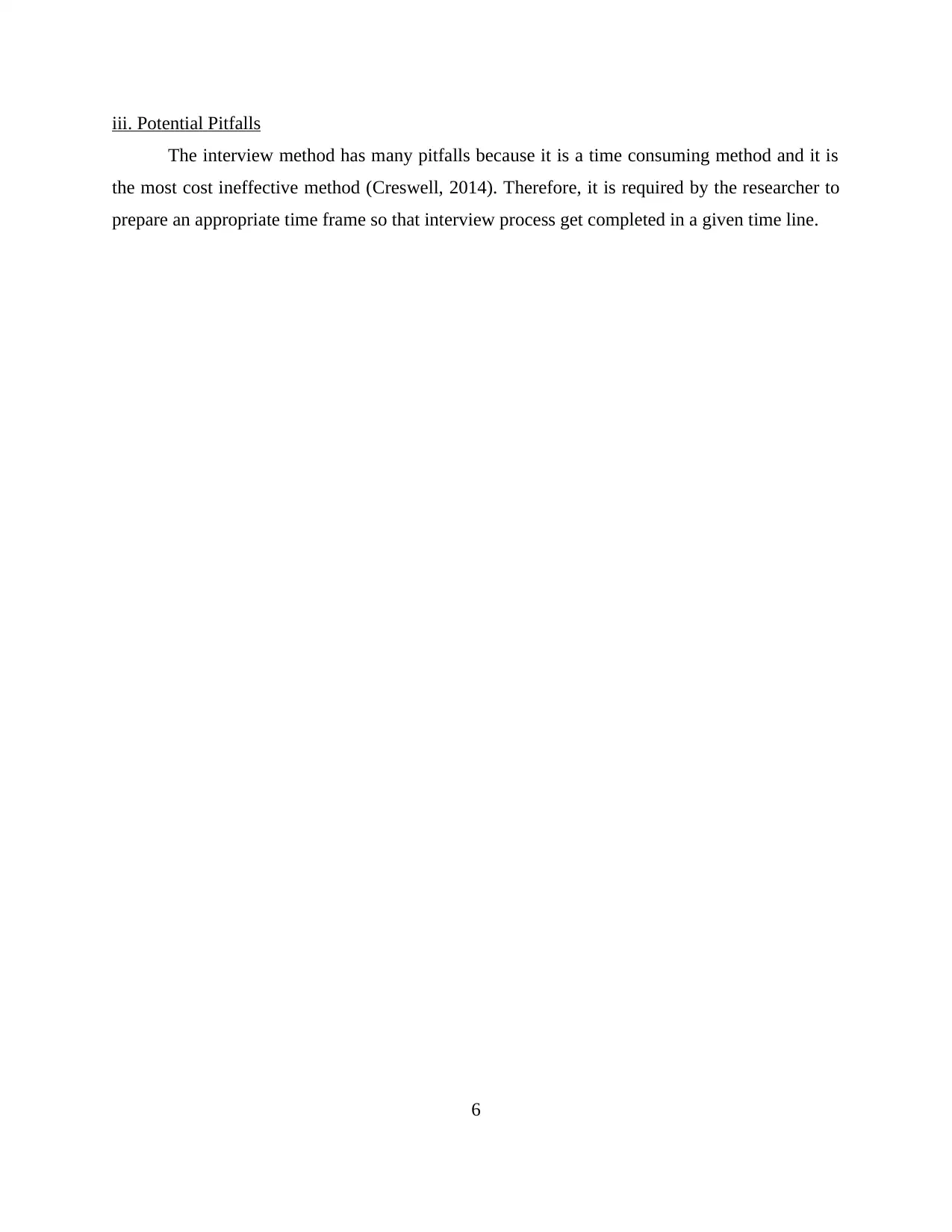
iii. Potential Pitfalls
The interview method has many pitfalls because it is a time consuming method and it is
the most cost ineffective method (Creswell, 2014). Therefore, it is required by the researcher to
prepare an appropriate time frame so that interview process get completed in a given time line.
6
The interview method has many pitfalls because it is a time consuming method and it is
the most cost ineffective method (Creswell, 2014). Therefore, it is required by the researcher to
prepare an appropriate time frame so that interview process get completed in a given time line.
6
⊘ This is a preview!⊘
Do you want full access?
Subscribe today to unlock all pages.

Trusted by 1+ million students worldwide
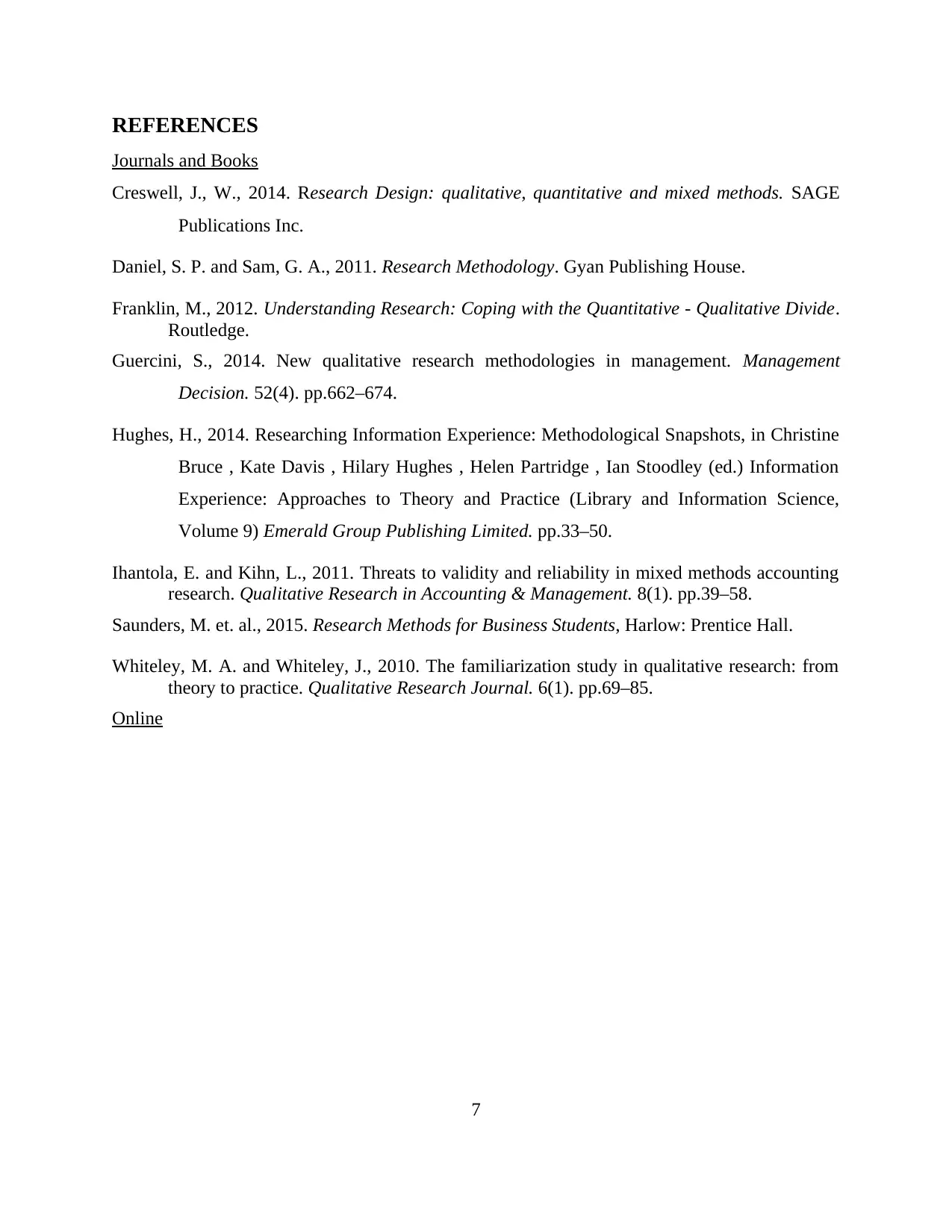
REFERENCES
Journals and Books
Creswell, J., W., 2014. Research Design: qualitative, quantitative and mixed methods. SAGE
Publications Inc.
Daniel, S. P. and Sam, G. A., 2011. Research Methodology. Gyan Publishing House.
Franklin, M., 2012. Understanding Research: Coping with the Quantitative - Qualitative Divide.
Routledge.
Guercini, S., 2014. New qualitative research methodologies in management. Management
Decision. 52(4). pp.662–674.
Hughes, H., 2014. Researching Information Experience: Methodological Snapshots, in Christine
Bruce , Kate Davis , Hilary Hughes , Helen Partridge , Ian Stoodley (ed.) Information
Experience: Approaches to Theory and Practice (Library and Information Science,
Volume 9) Emerald Group Publishing Limited. pp.33–50.
Ihantola, E. and Kihn, L., 2011. Threats to validity and reliability in mixed methods accounting
research. Qualitative Research in Accounting & Management. 8(1). pp.39–58.
Saunders, M. et. al., 2015. Research Methods for Business Students, Harlow: Prentice Hall.
Whiteley, M. A. and Whiteley, J., 2010. The familiarization study in qualitative research: from
theory to practice. Qualitative Research Journal. 6(1). pp.69–85.
Online
7
Journals and Books
Creswell, J., W., 2014. Research Design: qualitative, quantitative and mixed methods. SAGE
Publications Inc.
Daniel, S. P. and Sam, G. A., 2011. Research Methodology. Gyan Publishing House.
Franklin, M., 2012. Understanding Research: Coping with the Quantitative - Qualitative Divide.
Routledge.
Guercini, S., 2014. New qualitative research methodologies in management. Management
Decision. 52(4). pp.662–674.
Hughes, H., 2014. Researching Information Experience: Methodological Snapshots, in Christine
Bruce , Kate Davis , Hilary Hughes , Helen Partridge , Ian Stoodley (ed.) Information
Experience: Approaches to Theory and Practice (Library and Information Science,
Volume 9) Emerald Group Publishing Limited. pp.33–50.
Ihantola, E. and Kihn, L., 2011. Threats to validity and reliability in mixed methods accounting
research. Qualitative Research in Accounting & Management. 8(1). pp.39–58.
Saunders, M. et. al., 2015. Research Methods for Business Students, Harlow: Prentice Hall.
Whiteley, M. A. and Whiteley, J., 2010. The familiarization study in qualitative research: from
theory to practice. Qualitative Research Journal. 6(1). pp.69–85.
Online
7
1 out of 7
Related Documents
Your All-in-One AI-Powered Toolkit for Academic Success.
+13062052269
info@desklib.com
Available 24*7 on WhatsApp / Email
![[object Object]](/_next/static/media/star-bottom.7253800d.svg)
Unlock your academic potential
Copyright © 2020–2026 A2Z Services. All Rights Reserved. Developed and managed by ZUCOL.




